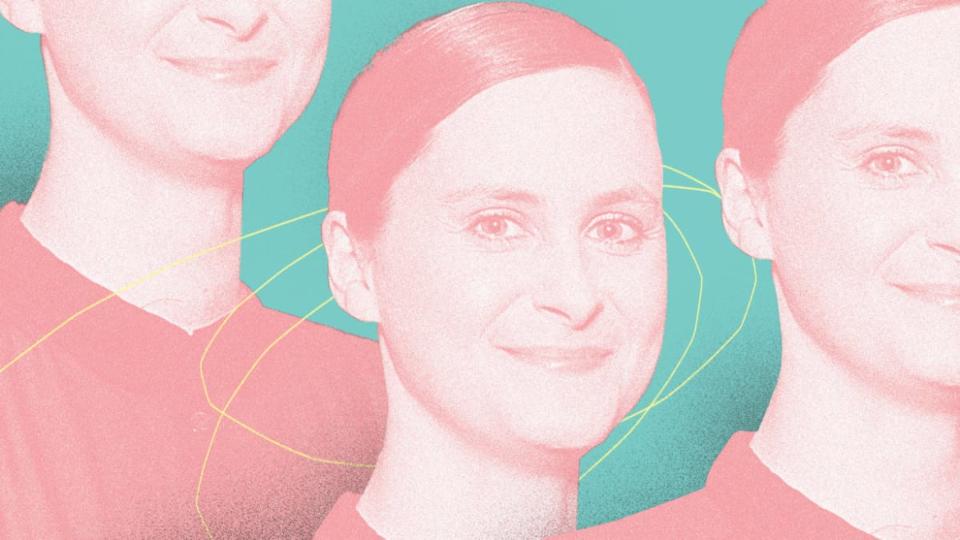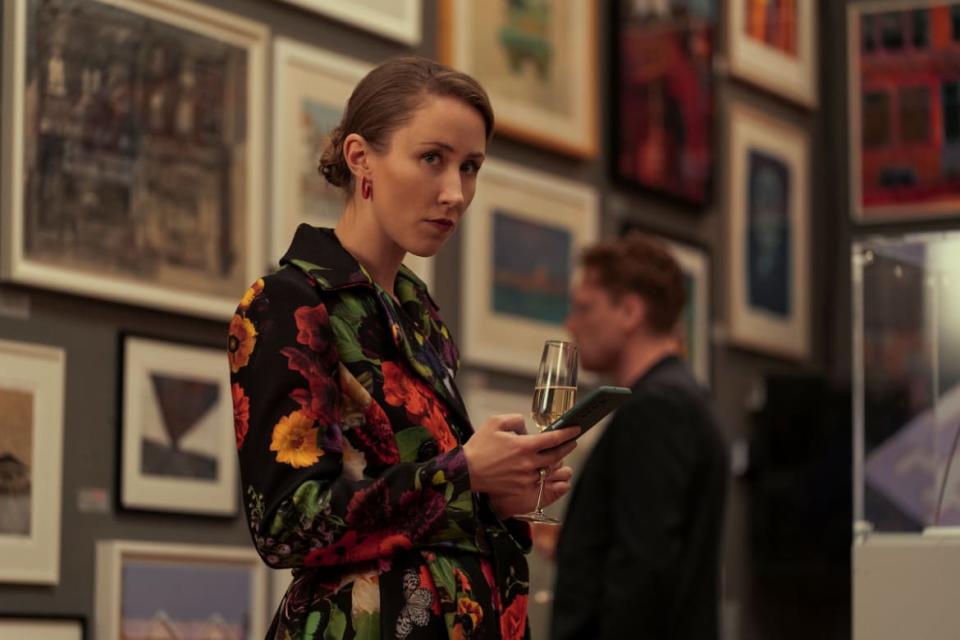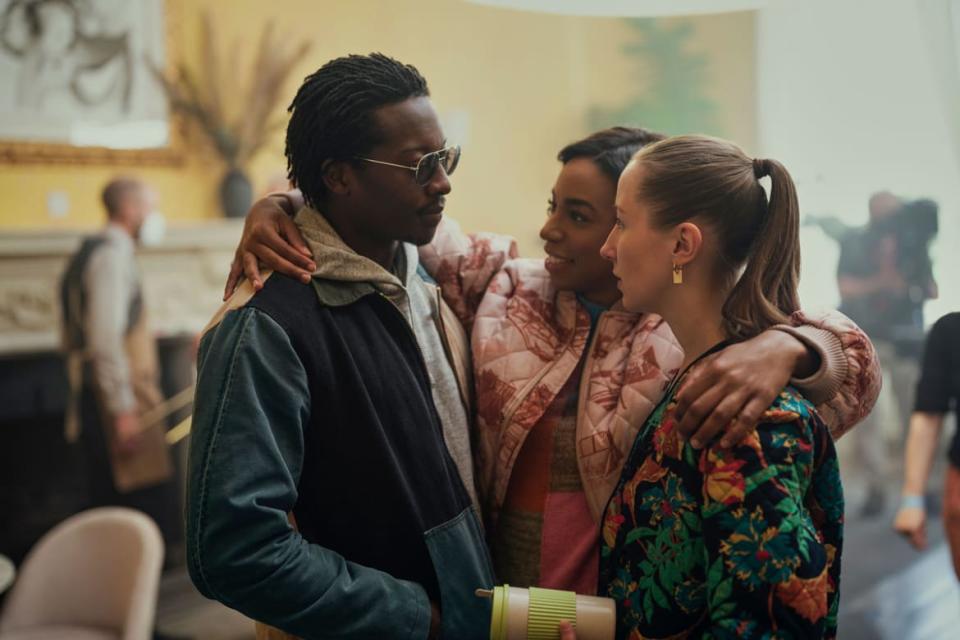How to Make the Most Horrifying Thriller of 2022: The Creator of ‘Chloe’ Spills

It breaks my heart to say that Drew Barrymore would have nothing to do in the Scream of 2022.
Gone are the days of characters gingerly picking up the receiver of their clunky landline, not knowing what terror waited for them on the other end. Repeated calls from a strange voice asking, “What’s your favorite scary movie?” would be hit with the block button and the emergency call slider on your iPhone. If someone has tied your hunky quarterback boyfriend up on your patio, all you’d have to do is give the Citizen app a quick scan to see if there had been any similar events in the area.
Our modern level of tech-infused connectivity has all but removed the mysteries from life, and taken the thriller genre with it.
But while our plugged-in second nature has the ability to make us feel safe, it has also left us even more vulnerable. In 2019, a stalker claimed that he determined the location of a Japanese pop singer through the reflection in her eyes in a photo posted online. In an episode of Keeping Up with the Kardashians, the elder Kardashian sisters tried to scare their younger sister Kylie out of tagging her location on Snapchat after run-ins with her own stalker.
It’s a deceptively dangerous world out there, one that can be manipulated with even the simplest of lies. Chloe, the freaky new six-episode Amazon Prime miniseries, dives into those kinds of lies headfirst, exploring why they’re told and the different kinds of harm they cause—and how our obsession with technology and social media makes it so easy to pull them off.

Chloe revolves around a twentysomething girl named Becky (Erin Doherty) who thinks her life could be more exciting and glamorous than it is. She’s stuck in a career rut, working a temp position, and spends most of her spare time taking care of her mother, who has early-onset dementia. Her daily escape is following other people’s lives through their social media accounts.
One morning, Becky discovers that one of her favorite people to keep tabs on, Chloe, has suddenly committed suicide—at least gauging by the cryptic goodbye message she posted online. In a disturbingly quick amount of time, Becky works her way into Chloe’s inner circle using handy tech tricks and her unassuming wit to try. Once she’s grifted her way in, she attempts to put the pieces of Chloe’s life and death together.
Ahead of the series premiere, The Daily Beast spoke with Alice Seabright, the show’s writer/creator and the director of its first three episodes, about how she managed to plot such an intricately-layered web of deception, the classic film thrillers she used as inspirations during production, and how our modern desire to be perceived can fuel our darkest machinations.
I just wanted to dive right in, because I’m dying to know where the idea for a series like this came from. It’s unlike anything else out there that we’ve seen before.
I was just very interested in writing about a character who uses lies to cover up certain insecurities and who also uses lies as a way to access things that she can’t access in her life—which could be for practical, pragmatic reasons or also for psychological reasons. And then at the same time, I was wanting to explore the themes of very intense female obsession and female friendships. So there were all these different things swirling around, and then they kind of clicked into place with the premise of the object of this obsession.
It’s such a current premise and so prescient too, in an eerie kind of way. It feels very now, but it also feels like it has been capturing the mood of the last 10 or 15 years.
It’s absolutely throwing up some contemporary issues but, in another way, some of my top influences when we were developing it were the stories like The Talented Mr. Ripley, Patricia Highsmith, and Rebecca. So it was also fun taking these more classic inspirations and commenting on them in a very contemporary world.
‘Chloe’ Is So Disturbing It Just Might Scare You Off Social Media
And Ripley and Chloe are so similar because their premise relies on keeping secrets and how, the more secrets we collect, everything will begin to fall apart no matter what. So I thought that made the show a very taut thriller, which was so great because the thriller genre has been dying out—I think because there’s more of a loss of privacy now. Do you think that secrets being more difficult to keep in a technologically-savvy world made it more difficult for you when plotting the show?
Plotting something in the contemporary world… is very different. It’s harder to keep a secret when people are onto you, but I think people hide just as much in some ways as they ever did. It’s just more in plain sight. Some of the themes I was interested in exploring were presentation and narrativizing and what version of yourself you put forward and what stories you tell people about who you are. I think people curate more, people control the way that they’re perceived in a way that’s highly thought through. In the past, it was less intentional.
Did you ever run into walls when you were trying to get Becky from one lie to the next? The way she dips in and out of everything is so natural, but I imagine it wasn’t an easy web of lies to create.
What was really fun was kind of to build it out with [the characters] and build it back to the start again. Here are the lies she needs to tell in order to get into the situation. Any one of those lies we can create a consequence for. So she says she knows Georgia the art dealer, well, let’s bring Georgia in! And of course, she’ll find herself in a situation because of a lie she told, and she’ll have to tell a new lie to cover up the old one. Watching her under pressure trying to get out of those situations is part of the tension and fun of the story, but also I think it’s truthful to how lying is unsustainable.
And it makes it so breathless for the viewer, too.
As a viewer and a reader, I have always found someone trying to get out of a lie to be one of the tensest things to watch. More than someone being chased! So I was hoping that would translate to the audience. Even the way we shot it, you’re with her and you’re experiencing it—the forces of danger are the person who’s going to come into the party and knows [Becky] is not who she says she is. The stakes are not life and death, but I think, for me, they should feel like life or death.

I wanted to talk a bit about the relationships between the women in the show, particularly Becky and her mother. That was such a beautiful and nuanced depiction of motherhood and being a daughter and all of the complications that come with that relationship, especially when we have to take care of our own parents or when complications arise. I wanted to know why it was so important to you to show that side of Becky’s life so vividly.
I think that, for me, it’s so who she is as a person. How we see ourselves has so much to do with our close relationships with our family. Her mum is her closest relationship, really, she’s the only person who really knows [Becky]. And her memory is fading. I think that’s a really destabilizing place to find yourself in. Another theme of the show is how identities are forged by the people we’re in connection with. How our friendships define who were are. Part of the reason she’s so fractured in her sense of identity is because she just doesn’t really have anyone to ground her apart from this one person who’s disappearing.
Connection and rejection are our biggest wants and our biggest fears in life. They’re two sides of a coin, and you see those highlighted really strongly in Becky, how she wears that need and that fear at once.
That’s so true. She’s desperately yearning for connection and she’s incredibly terrified of rejection. And they are the same aspect, really, of her character.
I wanted to talk to you a little bit more about the technical side of the show because, in the last three episodes, there were these very tense moments with long pockets of silence where Becky finds herself alone in this big, empty house. It felt intentional to me, making Becky’s environment feel more isolated as a contrast to her getting deeper into this friend group and her lies.
Absolutely. There’s a shot [from episode one] that we intentionally mirrored when [Becky] is outside Chloe and Eliott’s house it looks so beautiful and so wonderful. And at the end of episode three, we kind of pull out and we leave her there and we’re on the outside looking in at her. Then, of course, the house ends up not being this appealing, wonderful place—it ends up being much darker than that. She has this fantasy of [the house being] a place of connection, and it ends up being a place of isolation.
The 50 Most Anticipated TV Shows of Summer 2022, From ‘House of the Dragon’ to ‘Stranger Things’
This is a limited series with only six episodes, in a time when we’re all built to binge everything that we like all at once. But I also think Chloe works so well as a binge-watch because it makes you want to put your phone down, you don’t want to look at Instagram, and you feel like you’re being watched. How did you envision audiences viewing it?
If you have the time to sit down and watch it in one sitting then that’s great, because it works as one story. But I often find that taking a little bit more time allows the isolation of thoughts and to sit with something. When I have been able to do that, I’ve found that it’s a really great way to watch something. You sort of keep coming back to the world when you’ve had a bit of time to sit with it and ruminate on everything. But I think both ways are great! Anyone watching it is wonderful in my book.
It’s definitely a world that [people will be] inclined to come back to. I think I’m going to notice a lot more on the second or even third watch.
I think that [because of the intricate nature of the show], there’s a lot of Easter Eggs and things like that. Little bits that on the first watch you wouldn’t understand the significance of. Nothing big…just little details. [Laughs].
And Erin is so amazing in the show.
The show rests on her. With an actor of less talent than her, it would’ve been very, very hard. She doesn’t just pull it off but kind of slides with it, and we were very lucky.
It feels like she’s a natural-born liar.
But then you meet her and she’s this really lovely person! So down to earth and you’re like, “You’re lying? Mmm…I don’t know!”
It felt incredibly natural to watch this person lie, but speaking to you, it doesn’t seem like you’re that much of a liar.
No! I’m really, really bad at it!
Maybe this is kind of a way to live your dreams vicariously?
Exactly, it’s like, if only.
Get the Daily Beast's biggest scoops and scandals delivered right to your inbox. Sign up now.
Stay informed and gain unlimited access to the Daily Beast's unmatched reporting. Subscribe now.

 Yahoo Movies
Yahoo Movies 